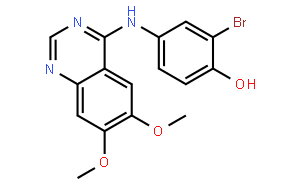| Description |
WHI-P154 is a potent JAK3 inhibitor with IC50 of 1.8 μM, no activity against JAK1 or JAK2, also inhibits EGFR, Src, Abl, VEGFR and MAPK, prevents Stat3, but not Stat5 phosphorylation. |
| In vitro |
WHI-P154 is first described as a JAK3 inhibitor that displays no activity at JAK1 or JAK2. WHI-P154 inhibits STAT1 activation, iNOS expression and NO production in macrophages in vitro. But it is proved that WHI-P154 also inhibits other common kinases including EGFR, Src, Abl, VEGFR, MAPK and PI3-K and induces apoptosis in human glioblastoma cell lines. [1] WHI-P154 inhibits glioblastoma cell adhesion and migration in the context of ECM.[2] WHI-P154 exhibits significant cytotoxicity against U373 and U87 human glioblastoma cell lines, causing apoptotic cell death at micromolar concentrations. The in vitro antiglioblastoma activity of WHI-P154 is amplified > 200-fold and rendered selective by conjugation to recombinant human epidermal growth factor (EGF). In vitro treatment with EGF-P154 results killing of glioblastoma cells at nanomolar concentrations with an IC50 of 813 nM, whereas no cytotoxicity against EGF-R-negative leukemia cellsis observed, even at concentrations as high as 100 mM.[3]
|

 COA
COA MSDS
MSDS HPLC
HPLC NMR
NMR